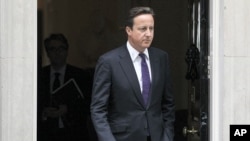British Prime Minister David Cameron has announced new measures to restore order to Britain's streets and prevent the riots that have gripped the country for much of the past week from erupting again.
Speaking at an emergency session of parliament Thursday, Mr. Cameron told lawmakers authorities are considering ordering youths to remove masks and temporarily disabling social networking websites that rioters have used to coordinate their activity. He said he would keep a higher police presence of 16,000 police officers in London through the coming days and consider calling in the army to help.
The prime minister said the rioting is not about politics or protest, but the result of a culture that "glorifies violence." He blamed street gangs for helping to spark the riots and said he would seek advice from U.S. cities such as Boston, Los Angeles and New York that had fought gangs.
Mr. Cameron said Britain "will not allow a culture of fear to exist on its streets," warning looters that they will be tracked down and prosecuted. He reiterated that police had already been authorized to use water cannon, batons and plastic bullets if necessary.
Mr. Cameron and lawmakers cut short their summer vacations to deal with the crisis, which saw its first calm night Wednesday after four straight nights of rioting, looting and arson. Police and witnesses reported just minor incidents as thousands of riot police filled the streets of London, Manchester, Liverpool and Birmingham.
Earlier Thursday, police began raiding houses in London in connection with the riots. Deputy Assistant Commissioner Steve Kavanagh said more than 100 arrest warrants will be served in the "coming hours and days."
British courts are struggling to deal with a massive backlog of cases from the unrest. Police already have arrested more than 1,200 people since the riots began on Saturday. The violence was originally touched off by the fatal police shooting last week of a 29-year-old man in London's economically depressed Tottenham neighborhood.
Mr. Cameron has faced criticism in connection with his plan to reduce the police budget by 20 percent. On Wednesday, London Mayor Boris Johnson criticized the proposed cuts, saying the riots do not allow for "substantial cuts" in police numbers. Mr. Cameron previously said the cuts will not "reduce the amount of visible policing."
Hundreds of youths - many saying they are sick of unemployment and cuts in government help - have burned buildings and cars, looted stores, smashed windows, and attacked police. Many of the riot victims are small business owners who say they have taken up weapons to protect their property.
Birmingham police opened a murder investigation Wednesday when a car ran over and killed three men, apparently while they tried to protect their neighborhood from looters. Police have a suspect in custody.
The only other fatality of the riots was a man who died Wednesday of gunshot wounds in south London in Croydon district. Hundreds of people have been injured in the unrest, mostly police officers.
The violence has raised questions about security as London prepares to host the 2012 Olympic Games. A Wednesday match between England and the Netherlands at London's Wembley stadium was canceled.
Britain Announces New Measures to Restore Order




